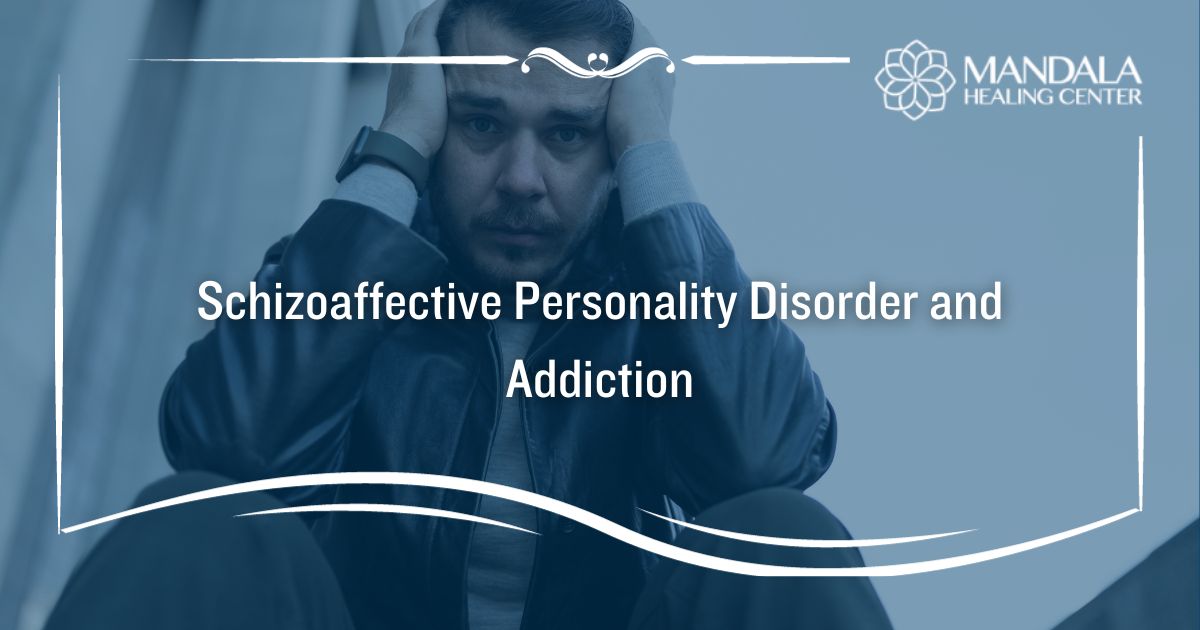Schizoaffective disorder is the type of mental illness that causes symptoms of a major mood disorder, such as depression or mania, and the primary symptoms of schizophrenia. To meet the criteria for schizoaffective personality disorder, people must experience symptoms like hallucinations or delusions for at least two weeks without depression or mania.
Schizoaffective disorder can significantly disrupt people’s lives and put them at risk for short and long-term mental health and physical complications. There is also a link between schizoaffective disorder and addiction, and people living with both conditions must receive comprehensive dual-diagnosis treatment.
This article will explore the connection between schizoaffective disorder and addiction, how to recognize this condition, and how to seek treatment. Reach out to the Mandela Healing Center specialists to learn more about our holistic approach to substance abuse treatment or to be connected to support at any stage of your recovery journey.
What is Schizoaffective Personality Disorder?
Schizoaffective disorder is a mental illness characterized by symptoms of schizophrenia and a mood disorder. There are two types of schizoaffective disorder.
- Bipolar type: Includes manic episodes and periods of major depression.
- Depressive type: Only includes depressive episodes.
There is no universal course for Schizoaffective disorder. Each person may have their own symptoms with different severities and durations. Untreated schizoaffective disorder can disrupt a person’s life in many ways. Many people with schizoaffective disorder have difficulties maintaining work, attending school, or having meaningful, healthy relationships.
Treatment for schizoaffective disorder can allow people to manage their symptoms and experience a better quality of life.
Some of the common symptoms of schizoaffective personality disorder include:
- Delusions
- Hallucinations
- Odd or erratic behavior
- Depression, characterized by feelings of emptiness or worthlessness
- Periods of mania, characterized by increased energy, decreased sleep, and erratic behaviors
- Impaired academic, occupational, or social functioning
- Inability to manage hygiene or other activities of daily living
- Poor communication, including delayed or incoherent speech
People who exhibit these symptoms of schizoaffective disorder should talk to their doctor or mental health professional.
The Link Between Schizoaffective Disorder and Addiction
Abusing drugs and alcohol cannot cause somebody to develop schizoaffective disorder. People who exhibit signs of psychosis while on drugs may meet the criteria for a diagnosis of a substance-induced psychotic disorder. People who have psychotic symptoms should undergo lab testing to rule out the effects of drugs or alcohol as the cause of their symptoms.
Once someone has received a diagnosis of schizoaffective disorder, it is crucial to be aware of the link between this condition and addiction. People with psychotic and mood disorders have higher rates of substance abuse than the general population and require specialized substance abuse treatment programs that include mental health treatment.
Unlike other substance use disorders that begin with self-medication, people with schizoaffective disorder do not typically start using drugs and alcohol to medicate their symptoms. There is little evidence that people with schizoaffective disorder use drugs and alcohol to manage their symptoms. However, researchers believe that hereditary and environmental conditions can increase a person’s chances of developing addiction if they live with a mental illness like schizoaffective disorder.
Treatment for Schizoaffective Disorder and Addiction
When someone lives with a mental illness and substance use disorder, it is called having a dual diagnosis. People with a dual diagnosis must receive comprehensive treatment for both conditions to be successful in recovery.
Treating only the schizoaffective disorder would mean that a person is likely to continue using drugs and alcohol, which could jeopardize their mental health treatment. In the same way, only addressing substance abuse would leave people still struggling with symptoms of their mental illness, which would likely jeopardize their recovery.
So, what happens in a dual-diagnosis treatment program? People receive comprehensive, evidence-based treatments for their mental illness and addiction at the same time. A dual-diagnosis treatment program is designed to help people address the environmental, behavioral, emotional, and physical aspects of their mental illness and substance abuse.
Treatment plans are individualized and typically include the following:
- Individual counseling
- Group therapy
- Family therapy
- Medications
- Mental health treatments
- Relapse prevention education
- Coping skills
- Yoga, massage, nutrition support, art therapy, and other holistic treatments to support whole-person healing
- Aftercare planning
Dual diagnosis treatment is available in several levels of care, including:
- Outpatient programs
- Inpatient and residential treatment
- Intensive outpatient programs (IOPs)
- Partial hospitalization programs (PHPs)
A dual-diagnosis treatment program will allow people to identify the underlying cause of their substance abuse and work to overcome it while also receiving specialized care for their mental illness. After completing a treatment program, ongoing support is essential to helping people with schizoaffective disorder and addiction live healthy, sober lifestyles.
Find Treatment for Schizoaffective Personality Disorder and Addiction
If you or someone in your life lives with schizoaffective personality disorder and addiction, contact the Mandala Healing Center specialists for support. Our holistic, comprehensive programs can help you live the fulfilling, sober lifestyle you deserve. Call us today to get started toward your healthier future.












